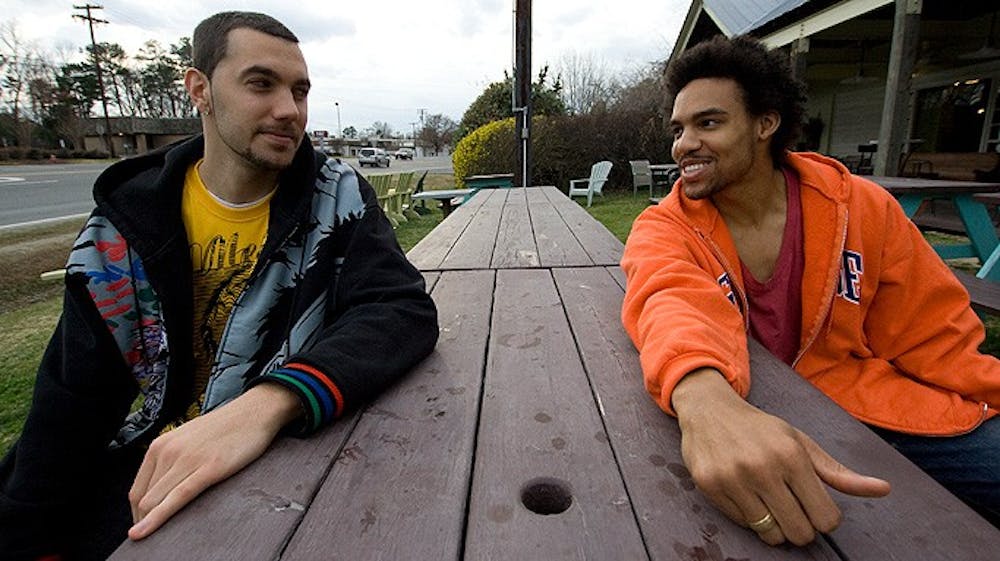On the last day of January, two men in knit caps and hoodies walked into the Durham Performance Learning Center, stood up on tables in its crowded cafeteria and started yelling.
“How many of y’all like poetry? How many of y’all like hip-hop? Yeah? Aight, well check this out, then!”
And then Pierce Freelon and Kane Smego started performing spoken-word poems, delivering rhymes with such thunderous flow that students leapt out of their chairs. They were recruiting participants for Poetic Justice, their spoken-word after-school program, and by the time they left, they had handed out 70 applications—or one to nearly every student in the room at the small, nontraditional high school geared toward children who have not performed well in traditional settings.
First offered at Jordan High School in September, Freelon and Smego began a second 10-week program at DPLC last Tuesday. Their course promotes artistic expression, providing an outlet for students who are otherwise struggling.
“[Freelon and Smego] are addressing the needs of kids who have been neglected by the public school system and who don’t fit in the traditional mold,” said Danielle Riley, an English teacher at Jordan who works with students who struggle with literacy. “The talents they do have are writing and spitting their poems, and there’s not a lot of opportunity to do that in the fast-paced, highly-tested, highly-driven curriculum of our public school system.”
Smego, widely considered one of the best slam poets in the world, is on the Bull City Slam Team and has led the Sacrificial Poets—the Triangle’s youth team—to national championships in each of the last three years. Freelon is a professor at North Carolina Central University and the University of North Carolina at Chapel Hill and also raps for The Beast, an alternative hip-hop group.
The two men—Durham natives with UNC diplomas and neatly-trimmed facial hair—have extensive backgrounds in hip-hop. Both started rapping in grade school before later directing their interests toward academics. Freelon’s honor thesis was an outline for a hip-hop-culture-based academic curriculum, and Smego developed a spoken-word curriculum as an independent study his senior year.
The pair began collaborating when Smego needed another facilitator to put his curriculum into practice. Combining Smego’s hands-on experience and Freelon’s academic background, they developed a program and received $20,000 in grant money. Supported by the Hayti Heritage Center and the Durham County Juvenile Crime Prevention Council, the grant comes from state and county government, the North Carolina Arts Council and local foundations.
‘A sense of belonging’
The unconventional, consensus-based classroom setting has a simple rule.
“Whoever comes out—[a] teacher who wants to watch, whoever it is—if you’re in the classroom, you have to contribute and take part in the workshop or activity because it eliminates that power dynamic,” Freelon said.
As artists who blend rapping, storytelling, dance and theatre, spoken word poets do not simply recite lines, they perform them. And students who struggled to memorize single sentences in the first week performed entire poems at the end of the program.
“[The program]... gave me more confidence,” said Percy Watson, a junior at Jordan. “I grew up in a big house, and it taught me how to release emotions in a way that wasn’t physical.”
Freelon and Smego work with social workers, parole officers and school officials to recruit students who are failing at least one class or who have been involved with the juvenile justice system.
The course focuses on writing, performance and the history of spoken word. At the beginning of each class, Smego and Freelon direct students to write creatively on a prompt. After dinner—which is provided because the program runs late—the students discuss a specific literary device or a performance exercise. The participants are so enthusiastic about sharing their own poetry, Freelon said, that the class routinely runs over the allotted time.
The graduates of the program have visibly changed in their attitudes and behavior, Riley noted.
“Seeing the students in halls now, they have a sense of pride and accomplishment and ownership of the creative sort,” she said. “And beyond all of that is a feeling of connectedness—there’s a reason to come to school, a sense of belonging.”
Poetic Justice first performed in January at a Research Triangle Park gala at which Durham Public Schools Superintendent Eric Becoats unveiled his strategic plan to improve schools. Carlton Royster, a junior at Jordan, was one of the last to perform.
Head bowed, Royster planted his feet broadly and dropped his shoulders. Raising his chin to level his eyes with his audience, he began.
“I am a king/ Within this game I can’t be taken out, I won’t be taken out/ I got my pawns, my bishops, my knights and my queen/ Believe me, I’m not going down/ I am a king.”
Get The Chronicle straight to your inbox
Signup for our weekly newsletter. Cancel at any time.

